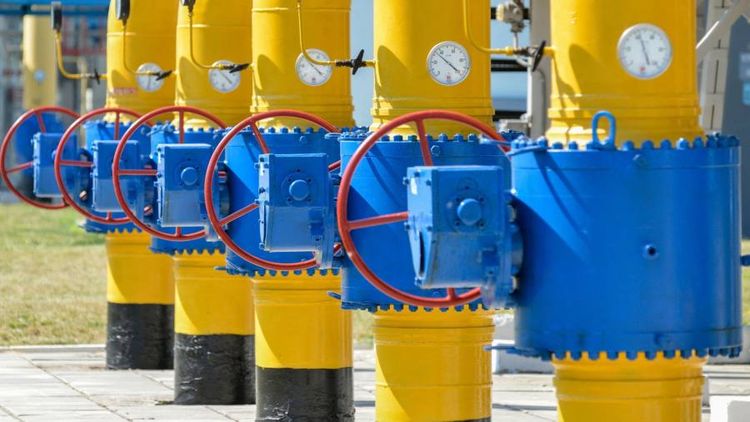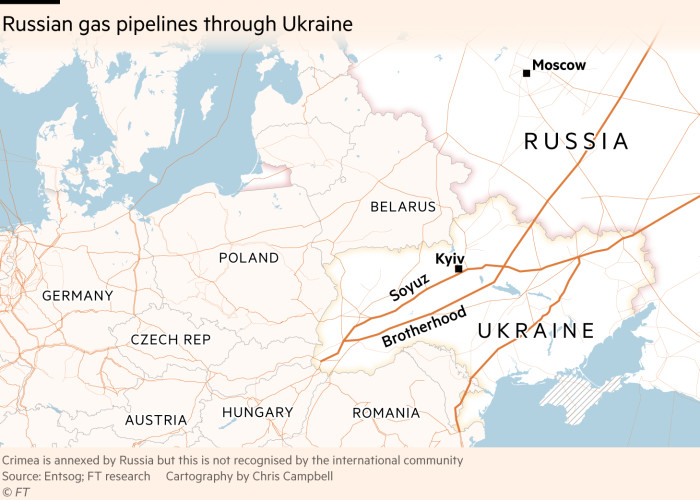Russia gas flows through Ukraine could stop next year, Kyiv says

Get the latest updates on the ongoing conflict in Ukraine for absolutely no cost. Stay informed and up-to-date on the happenings in the region with our reliable and timely news updates. Don't miss out on any important developments. Subscribe now to get all the news about the War in Ukraine.

Every morning, we will send you an email called myFT Daily Digest that will provide you with a summary of the newest news regarding the War in Ukraine.
The Ukrainian energy minister has announced that the supply of Russian gas to Europe via one of the final pipelines may stop by the end of next year. This is when Ukraine’s agreement with Gazprom will come to an end.
During a discussion with the Financial Times, German Galushchenko stated that the likelihood of Kyiv and Moscow coming to an agreement for the continuation of the transit contract, initially approved in 2019, was low. This is despite the route through Ukraine providing almost 5% of the gas imports for Europe.
Galushchenko was asked if Ukraine was willing to renegotiate the agreement with Moscow after the invasion last year. He expressed his disbelief, stating that he couldn't fathom it happening in a bilateral manner.
He mentioned that we are getting ready to reduce our supply in the system.
Last year, when Moscow decided to reduce the amount of gas it supplies to Europe, it caused a major energy crisis. This caused inflation to rise and made living expenses go up all over the continent. Although many ways of getting gas were stopped, the pipeline from Ukraine is one of the two that still gives gas, even though it's not as much as before.
In May, approximately 50% of Austria's gas imports came from Russia through Ukraine, as reported by energy consultancy ICIS. Meanwhile, in Slovakia, the pipeline was responsible for 95% of their gas imports.
According to the minister of energy, Europe is expected to handle any further supply reduction fairly well since they have learned to cope with similar cuts before. To mitigate negative effects, they reduced demand and sought out other options, like importing liquefied natural gas.
This marks the initial recognition from Kyiv that the agreement supporting the continuation of Russian gas transit through Ukraine will most likely not be extended beyond the end of the coming year.
If the Ukrainian transit route is blocked, TurkStream would become the sole pipeline still transporting gas from Russia to Europe. This pipeline only serves countries located in the south-east of the continent, and in May it provided just under 3% of the total gas imported by Europe.
Although Galushchenko proposed that European politicians might want to re-discuss the agreement, as it occurred in 2019 with the participation of an EU delegation, who organized three-sided conversations with Russia and Ukraine, experts believe that this is improbable due to the challenging perception of having negotiations with Moscow.
The European Commission has not made any statement about attempting to initiate discussions with Russia regarding the extension of the contract.
If there is a decrease in the gas supply by even a small amount, there is a chance for an increase in prices throughout the continent. This is due to the current state of the global gas markets. However, it is predicted that the availability of LNG will rapidly increase starting in 2025 with the introduction of large-scale projects in Qatar and the US.
In the beginning of this month, Mikhail Galuzin, who is a deputy foreign minister of Russia, expressed his opinion that if the agreement to transport gas through Ukraine was not extended, it would negatively impact the European Union. He also mentioned that Ukraine would be harming itself by losing the profits it gains from this transportation.
In 2022, gas prices in Europe skyrocketed to over 10 times their regular rate, equating to nearly $600 per barrel of oil. However, they have significantly decreased since then. At present, the TTF agreement is roughly worth €40 for every megawatt hour, which is almost 90 percent less than its apex in August of last year.
The existing gas transit deal was inked in December of last year, as a last-gasp pact that was finalized just a day before the previous one expired. This accord guaranteed the steady flow of Russian gas to Ukraine until 2024.
As part of an agreement, Gazprom, which is owned by the Russian state, promised to transport at least 65 billion cubic meters of gas in 2020 via the Ukrainian pipeline. In addition, they agreed to transport 40 billion cubic meters annually between 2021 and 2024. This arrangement would have ensured that Ukraine received $7 billion in transit fees.
At present, Russia is sending only around 12 billion cubic meters (bcm) of gas annually. The Ukrainian government asserts that Moscow has not paid the full transit fee as per the contract, even when the agreed upon volume of gas is not delivered.
One of Austria's major energy firms, OMV, has announced that it can provide electricity to its clients even without relying on gas from Russia. This is due to the company preparing itself since the invasion of Ukraine took place last year.
If the agreement expires, Gazprom may still transport gas through Ukraine by reserving capacity through auctions that their gas transmission system operator is obligated to conduct in accordance with European regulations.
Laurent Ruseckas, an analyst at S&P Global Commodity Insights, expressed uncertainty about the renewal of a contract that one party has not kept its promises, especially during the ongoing conflict between the two sides.
He stated that as long as the European purchasers desire it and Russia is willing to deliver it, the gas should keep on flowing in theory.
Alice Hancock from Brussels contributed to this report.









































